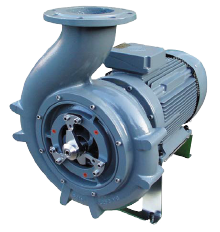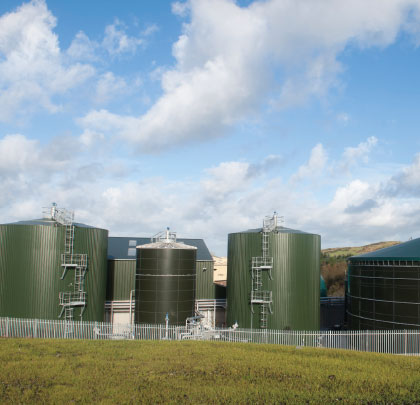A piped digester mixing system that utilizes pumps made by Landia is helping Biogen with its successful new $8.5 million (£5 million) food waste to green energy operation near Caernarfon in North Wales. The GwyriAD anaerobic digestion plant first includes a Landia MPTK chopper pump that mixes 12 percent dry solids in a buffer tank.
A further two MPTKs resuspend grit (when existing diffusers are not running) by the use of a pressurized ring main with four jetting nozzles, equally spaced around the base of a tank containing 9 percent dry solid digestate.
At a maximum particle size of 0.47 inches (12 millimeters) and temperature of 140 degrees Fahrenheit (60 degrees Celsius), digestate at dry solids 8 percent is also pumped by two more Landia MPTK chopper pumps at a flow rate of 9510 to 19,020 gallons (36 to 72 cubic meters) per hour at a maximum total head of 49.21 feet (15 meters).
The system at Biogen, the UK’s leading food waste anaerobic digestion specialist, further includes a 4.0 kilowatt 1500 revolutions per minute DG Landia pump to transfer digestate at dry solids 15 percent (but still liquid) maximum particle size 0.79 inches (20 millimeters), at a flow rate of over 5200 gallons (20 cubic meters) per hour.
Landia’s chopper pumps play an important part in the process, proving very capable of handling the different cycles of food waste.
Julian Stelmasiak | Biogen
In addition to renewable electricity (for 700 homes), Biogen’s GwyriAD AD plant also creates high quality biofertilizer for farms in the Gwynedd region, as well as helping the local council make a major reduction in the amount of waste sent to landfill.
Landia UK, which is celebrating its twentieth anniversary in 2014, also has its pumps and mixers in operation at Biogen’s Milton Ernest plant in Bedfordshire, where renewable energy is generated from nearly 52,000 tons (47,000 tonnes) of pig slurry and food waste per year generating 1.8 megawatts of green electricity and produces over 36,000 tons (33,000 tonnes) of a nutrient rich biofertilizer.
The plant will process over 12,000 tons (11,000 tonnes) of food waste per year by means of anaerobic digestion and will generate 3500 megawatt hours per year of renewable electricity for the nationwide grid. The location of the plant also allows the biofertilizer produced as part of the process to be used on local farmland.

The food waste will be collected from local households and will help Gwynedd Council meet its landfill diversion and recycling targets and avoid substantial fines for failing to meet those targets. The plant also provides a local facility to recycle food waste from commercial customers in the area. All the material being delivered to the plant will be carried in covered vehicles by licensed carriers.
The facility is designed to ensure that, when operational, controls are incorporated to limit noise and odour at source. All tipping and handling operations will take place in a fully sealed and insulated building. Bespoke, high quality air filtration systems are incorporated within the building to ensure that odours are controlled at source and do not leave the confines of the site ensuring that there is no negative impact on air quality for local residents and passing vehicles.
The plant is fully licensed and regulated by Natural Resources Wales under The Environmental Permitting (England and Wales) Regulations 2010, and Animal Health under Animal By-product Regulations (2005).
Gwynedd Council has introduced a weekly service to collect food waste, in order to maximise the collection of food waste, and increase its recycling performance.
■ ■ ■
[divider]
ABOUT THE AUTHOR
Soren Rasmussen is the director of Landia, Inc. For more information Landia’s range of applications, call 919.466.0603, email info@landiainc.com, or visit www.landia.com.
MODERN PUMPING TODAY, May 2014
Did you enjoy this article?
Subscribe to the FREE Digital Edition of Modern Pumping Today Magazine!


